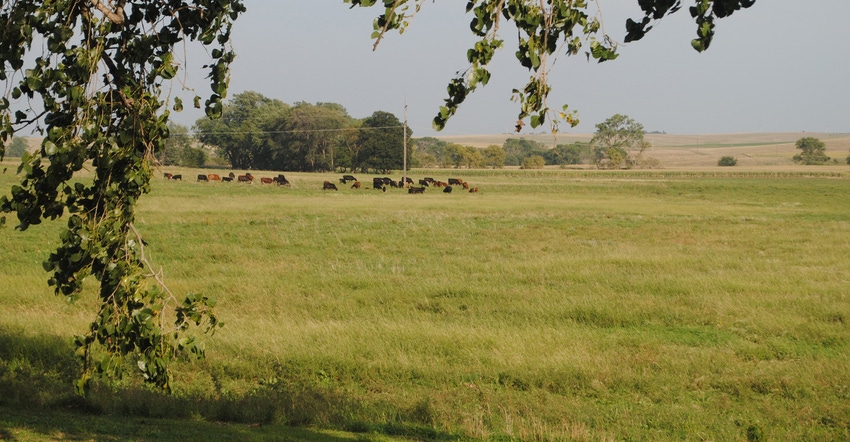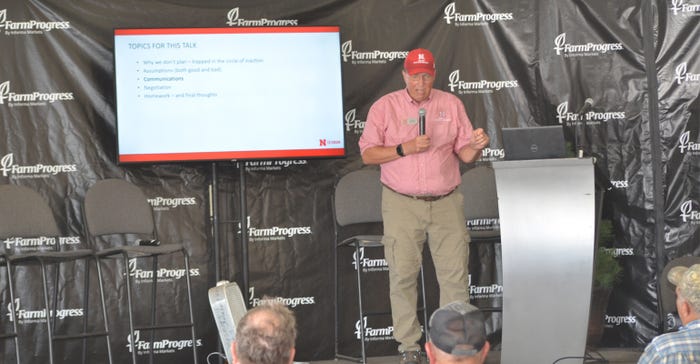September 30, 2022

I run across situations where one party, or both parties, have decided that their estate plan isn’t fair or equitable. I have also had recent contact with landlords who think the tenant is taking advantage of the farm lease and not paying an appropriate cash lease rate.
Either situation is a dispute, and everyone stops listening to each other. The parties dig in their heels and have made up their mind that they are not being treated fairly or equitably. When that happens, the relationship between the parties is usually permanently damaged at some level.
This damaged relationship is particularly sensitive to deal with when there are family members involved. So, when the business issue relates to family, maybe the first conversation is centered around the statement: “When we get done with this, are we still going to have a family or not?”
Please have that discussion before starting the conversation pertaining to either the estate transfer or the farmland rental agreement. Let’s get the “family” commitment first, which will help set the tone for a smoother conversation with relatives.
Ask questions
In a certain small percentage of situations, the on-farm party isn’t providing the information needed to make a good analysis of the overall equity of the transaction. The off-farm party, without proper background data or information, jumps to a negative conclusion because of that lack of information.
The key point of these discussions is to ask questions. Clarity and transparency build trust. The on-farm party needs to provide information to the other business partners whether they ask for it or not. Trust will be a key component of getting a positive outcome for the business conversation.

POPULAR PROGRAM: Allan Vyhnalek offers his insights into farm transition planning in a popular Husker Harvest Days session at the Nebraska Farmer Hospitality Tent stage.
Let’s give a specific example. I’ve run across a couple of situations where the cash rent wasn’t adjusted for more than 20 years. The grandparents have now passed, and the off-farm siblings are looking at the current rental rate, just incensed that their on-farm sibling hadn’t paid a “fair” rent — or even adjusted the rent — for a long time. They immediately assume that the on-farm sibling was cheating their parents and now needs to pay some level of “back rent.”
First, once the rent was agreed to and paid for any year, that contract is complete, and there is no such thing as “back rent.” Second, in most cases, the farmer had offered to pay their parents more, and the parents simply decided that more wasn’t necessary.
But more reflection is needed. Explore both sides of the story. There are cases where the farmer has taken over quite a few of the landlord expenses because they know that they have received a discounted rental rate.
These expenses might have included control of volunteer trees in pastures, providing their own fencing materials for fixing pasture fence, fixing excessive erosion in fields, covering all repair costs for the irrigation equipment, and installing terraces and other conservation structures as needed.
In addition, with low cash rent, the tenant might be paying the land taxes — as well as taking care of the new roof, windows and siding on the house; rocking the driveway; and maintaining the rest of the farmyard. All of those are usually landlord expenses.
Providing extra help
Beyond the land, in many cases that farmer and their spouse helped their parents with all the end-of-life steps, which might include daily tasks such as delivering meals and groceries; getting to assisted living, then to the nursing home or hospice; and all the medical appointments that come with the end-of-life issues.
One other observation: The farmer-tenant that has worked that property for dozens of years gets very attached to it, and they tend to view it as their own and forget that it is a part of the estate, or that it is rented property where the business agreement can be terminated. Both sides need to understand that this happens because you are attached to that property due to the “sweat equity” that you have put into it.
I’m not saying that this does happen in all cases, but I am suggesting that there be an honest conversation between the off-farm and on-farm family, including the sharing of how these financial arrangements and the attached feelings have been taken care of over the years.
As you have these conversations, please recognize first that if you are trying to make a fair agreement, that the definition of “fair” may be different between parities. Fair often implies equal division. To an on-farm heir, this may seem unreasonable, given their additional contributions to the farm and family.
Maybe trying to be “equitable” for both parties might be a healthier way to consider your options. An equitable approach seeks to account for special circumstances and acknowledges that fair is not always equal.
Vyhnalek is a Nebraska Extension educator and farm succession specialist.
You May Also Like




